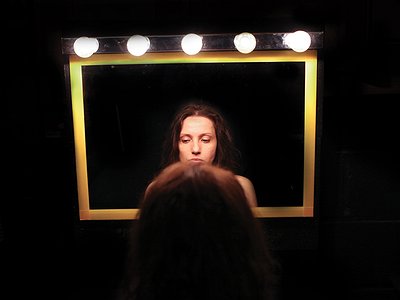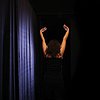Part 1
Name: Bérangère Maximin
Nationality: French
Occupation: Composer, Sound Artist
Current Release: Dangerous Orbits
Labels: Crammed, Sub Rosa, Tzadik
Artist Recommendations: Denis Dufour and Maryanne Amacher.
When did you start writing/producing music - and what or who were your early passions and influences?
My first consequent productions coincide with the moment I arrived at the Conservatoire's studios, when I started the acousmatic composition class with my teacher in the late 90s. They consist of little sound objects of a few seconds in which I had to put everything, coherence, style together with meaning. I quickly realised that what I had done before in high school was a pale copy of some mainstream pop songwriting and that it was very limited, if not of no point, though I consider my years of practice with rock bands at school as a crucial moment.
I discovered music through my friends' record collections which was mostly 60s British Beat and freak jazz like Frank Zappa. Then, my personal taste for more abstract forms growing, I quickly moved to more psychedelic records and then to the avant-garde with the concrete/acousmatic repertoire and the start of glitch and laptop music with Mille Plateaux artists, Pan sonic, Fennesz, Mouse on Mars, Scanner among others.
For most artists, originality is first preceded by a phase of learning and, often, emulating others. What was this like for you? How would you describe your own development as an artist and the transition towards your own voice?
I think the concept of originality is very ambivalent. Personality and confidence are a big part of it, the same way one has his own particular way of speaking or clothing. Artistic sensitivity, skills and your own method of working with them go together with self discovery and development, so I like to think that if I drew a timeline of my musical highlights, I could put most of my personal ones in parallel. This may be the most interesting angle because even a quick allusion to it translates the intensity and depth of the process and how the whole self's involved very well.
To me it would be like a little series of progressive crescendi inside a bigger one, symbolizing a constant fight for affirmation and the exchange of ideas, get it straight in the head to tell the other students, which is the equivalent of telling the world, together with giving shape to something deeper, less easy to pin down through the music, the process when you find out the music tells more than any speech, when you see the limits of language.
Then to me the next phase would be when you hook up with other musicians and try to find your place.
Then the one when the degree of tension is higher because it now involves the fact you have to make a living but also with higher expectations, the practice gets more intensive, your work is suddenly getting different feedback and the opportunities keep you stimulated. I think this is where I am now.
What were your main compositional- and production-challenges in the beginning and how have they changed over time?
Globally, my first concern was about the material itself and structure. I spent some time working on how to get eclectic sounds together in my own way, how to write with very different textures and stick them together, give them a precise function inside the structure. Since then that has been more centered around how to leave space to other elements like pure musical objects, melodies for instance, and the contrasts between the abstract and the literal.
Tell us about your studio, please. What were criteria when setting it up and how does this environment influence the creative process? How important, relatively speaking, are factors like mood, ergonomics, haptics and technology for you?
My studio is located at home in my living room, the place where I can stay in my home clothes, smoke, eat and nobody would come tell me anything. I basically live inside my studio, my life gravitates around it. The area where I live wasn't really a choice at the beginning but now it just seems the best place to work. The acoustic is dissymmetrical, but my ears have adapted and this has very much to do with the originality of sound that I've been talking about. I have a PA system consisting of 2 to 6 high quality pre-amplified speakers, a good hi-fi, an LP player and two laptops and screens, an analogue mixing board, midi controllers, several other devices, all patched with each other which makes it quite comfortable.
What are currently some of the most important tools and instruments you're using?
Mainly Protools, Ableton Live, GRM Tools with very affordable midi controllers. I like to keep it simple since I only need to make very basic manipulations.
Many contemporary production tools already take over significant parts of what would formerly have constituted compositional work. In which way do certain production tools suggest certain approaches, in which way do they limit and/or expand your own creativity? Are there any promising solutions or set-ups capable of triggering new ideas inside of you as a composer?
I kept my very early works on magnetic tapes, then DAT. When I got them transferred to a hard drive, it was surprising to hear that my style hasn't changed much since school. Well it has, but not in its essence, there were the same subjects of research and the same intentions even if at a very primitive stage. So I wouldn't say the computer and digital devices have changed my way of thinking. This realisation gave me the proper arguments during a recent conversation I had after a concert with someone coming to me saying that the computer induces working with loops. Which is totally untrue, of course. Working with loops or using certain filters is an aesthetic and political choice which isn't bound to technology. To me it is only a temporary state - in other terms, only a moment in the piece. And the fact is that I recently attended a concert with a bunch of analog synths. The concert being a little bit too long, it fell down in intensity and it became obvious there was only some playing with monochrome material, suffering from a systematic variation of speed and height.
There was a big jump from analogue to digital but the difference lies in the terrific new possibilities, such as being able to zoom into the sound and work with a very tiny portion, a macroscopic writing, also interesting new textures due to digital processing. But nevertheless, about composition, writing, structuration, analogue or digital is not to be opposed as for me, an inaccurate subject matter for argument.
Could you describe your creative process on the basis of a piece or album that's particularly dear to you, please? Where do ideas come from, what do you start with and how do you go about shaping these ideas?
Anything could sparkle a piece. This could be some strange recording I made or a book or a personal experience. To be precise, most pieces come from the work on music itself but then quickly more abstract notions come and enrich the first little sonic draft. On the new album, I intended to do long play pieces with material that would be based on obsessions and sensation you're stuck in some circle that always puts you back in the same situation but because you're more and more conscious of that fact, it causes things to get dysfunctional and as difficult to catch as images in remanence, some vertigo. The whole album developed towards the idea of false static image, as though there's a lot going on but you're staying in the same place. I even made some kind of remix from a piece of the previous album (mvt 3, Distance), well a re-interpretation, with this idea.






